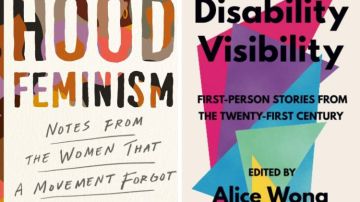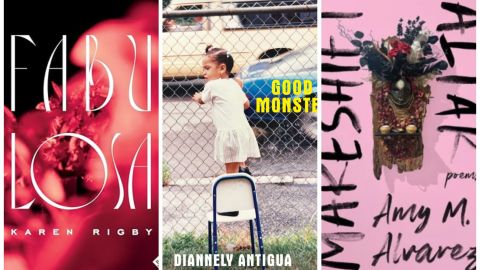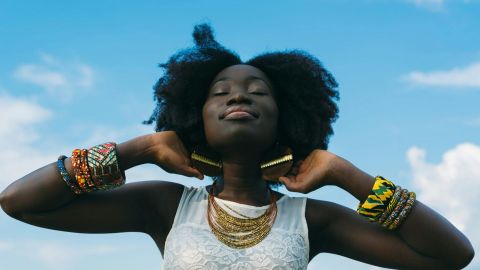8 Books by WOC to Read During Women’s History Month
Reading books about women who have challenged the status quo, redefined womanhood on their own terms, have challenged mainstream feminism, and ultimately, affected change within their own communities, should be something we all do year-round

Photo Credit: Amazon
Reading books about women who have challenged the status quo, redefined womanhood on their own terms, have challenged mainstream feminism, and ultimately, affected change within their own communities, should be something we all do year-round. But this Women’s History Month, it’s important to be even more intentional about the books we read that tell the stories of different types of women, from different walks of life.
More than that, it’s imperative that we continue to challenge ourselves through literature about women and women’s history. As author, activist, culture critic and author of Hood Feminism Mikki Kendall writes: “An intersectional approach to feminism requires understanding that too often mainstream feminism ignores Black women and other women of color are the proverbial canaries in the coal mine of hate.”
So, for this Women’s History Month and International Women’s Day on March 8, let’s seek books that empower and give voice to Black, Indigenous, Latinx, and LGBTQ women who have historically been overlooked.
Below we’ve compiled 8 of our favorite books to read for Women’s History Month and powerful quotes from each book.
wp_*posts
Hood Feminism: Notes from the Women That a Movement Forgot by Mikki Kendall

Photo Credit: Amazon
“Girls like me seemed to be the object of the conversations and not full participants because we were a problem to be solved, not people in our own right.”
In Hood Feminism, Mikki Kendall argues that mainstream feminists rarely talk about meeting basic needs as a feminist issue. For example, food insecurity, access to quality education, safe neighborhoods, a living wage, and medical care are all, in fact, feminist issues.
Through a collection of essays, Kendall gives voice to the women that modern feminist movements so often forget.
wp_*posts
Disability Visibility: First-Person Stories from the Twenty-First Century by Alice Wong

Photo Credit: Amazon
“This may feel true for every era, but I believe I am living in a time where disabled people are more visible than ever before. And yet while representation is exciting and important, it is not enough. I want and expect more. We should all expect more. We all deserve more.”
From Harriet McBryde’s account of her debate with Peter Singer over her own personhood to other contemporary essays by authors like Keah Brown and Haben Girma, Disability Visibility puts disabled creatives at the forefront.
Edited by activist and writer from San Francisco, Alice Wong celebrates and documents disability culture in the twenty-first century.
wp_*posts
The Purpose of Power: How We Come Together When We Fall Apart by Alicia Garza

Photo Credit: Amazon
“I define power as the ability to make decisions that affect your own life and the lives of others, the freedom to shape and determine the story of who we are. Power also means having the ability to reward and punish and decide how resources are distributed.”
Alicia Garza’s The Purpose of Power is an essential guide to building transformative movements that address the challenges of our time, much like how she founded and co-created the Black Lives Matter movement.
The civil rights activist walks through the years and lessons she learned about organizing and working hard for her community to get to where she is today.
wp_*posts
For Colored Girls Who Have Considered Suicide When the Rainbow Is Enuf by Ntozake Shange

Photo Credit: Amazon
“Where there is a woman there is magic. If there is a moon falling from her mouth, she is a woman who knows her magic, who can share or not share her powers. A woman with a moon falling from her mouth, roses between her legs, and tiaras of Spanish moss, this woman is a consort of the spirits.”
Published in 1997, For Colored Girls Who Have Considered Suicide When the Rainbow Is Enuf is a revolutionary award-winning play by lauded playwright and poet, Ntozake Shange. It’s a fearless portrayal of the experiences women of color face.
wp_*posts
Women Who Run with the Wolves: Myths and Stories of the Wild Woman Archetype by Clarissa Pinkola Estes

Photo Credit: Amazon
“All creatures must learn that there exist predators. Without this knowing, a woman will be unable to negotiate safely within her own forest without being devoured. To understand the predator is to become a mature animal who is not vulnerable out of naïveté, inexperience, or foolishness.”
Clarissa Pinkola Estés’ Women Who Run with the Wolves is a deeply spiritual book in which the author unfolds rich intercultural myths, fairy tales, and stories, in order to help women reconnect with the fierce and healthy of this instinctual nature.
It’s a must-read for any woman looking to learn more about the female psyche.
wp_*posts
We Are Here: Visionaries of Color Transforming the Art World by Jasmin Hernandez

Photo Credit: Abrams
Curated by Jasmin Hernandez, founder of Gallery Gurls, We Are Here features 50 profiles and portraits of artists and art entrepreneurs challenging the status quo in the art world.
The book further highlights the nuanced work of Black and Brown creatives transforming the art world and ultimately, centers BIPOC with a particular focus on queer, trans, nonbinary, and BIWOC. We Are Here features empowering and diverse voices from Los Angeles to New York, and in between.
wp_*posts
White Tears/Brown Scars: How White Feminism Betrays Women of Color by Ruby Hamad

Photo Credit: Amazon
“White women can oscillate between their gender and their race, between being the oppressed and the oppressor. Women of color are never permitted to exist outside of these constraints: we are both women and people of color and we are always seen and treated as such.”
White Tears/Brown Scars explores the ways in which white feminism has been used as a weapon of white supremacy and patriarchy deployed against Black and Indigenous women, and women of color.
Ruby Hamad’s book is a must-read in order to dismantle and unpack the ways that mainstream feminism that for centuries harmed marginalized communities in more ways than one.
wp_*posts
The Latina’s Bible: The Nueva Latina’s Guide to Love, Spirituality, Family, and La Vida by Sandra Guzman
The title of this book says it all. This is the second, updated edition of the original Latina’s Bible from Sandra Guzman released in 2002. It’s about navigating dating, sexuality, family, and career as a Latina with honesty and empowering words from Guzman, the former Editor in Chief at Latina magazine.
The Puerto Rico born-New Jersey-raised journalist writes in the intro: “I am a proud Latina. I am a proud American. I am not exotic. I am two cultures in one fabulous, curvaceous, cafe-con-leche body. I own English. I dream in Spanish. On most days, I’m delighted to explain this marvelous heritage to the curious and clueless who ask questions like, ‘So Sandra, what are you?’ Other days I just repeat to myself, ‘I am what I am.'”

















